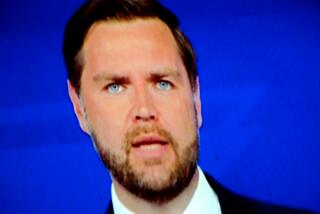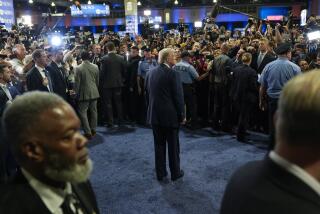Perot Should Have a Part in the Presidential Debates
- Share via
The nonpartisan Commission on Presidential Debates is scheduled to decide soon whether Ross Perot will be invited to join President Clinton and Bob Dole in a series of three nationally televised debates. That the Texas industrialist will be invited is by no means a sure thing. Perot, who won an impressive 19% of the vote when he ran for president four years ago, today has only single-digit support in the polls. Poll standing is one of the criteria the commission is considering in putting together the debates. We think Perot should be included, not least because of his presence on the ballot in all 50 states and his position as a national figure.
There’s a further reason. In this campaign, as in 1992, Perot plans to spend millions on taped and carefully edited “infomercials” that allow him to present, unchallenged, his views on the nation’s woes and what he would do to cure them. If he does not participate in the debates, live questioning of Perot may be largely limited to appearances with television’s Larry King and other deferential questioners. These are legitimate campaign devices, but it’s a disservice to the public if they wholly replace a fuller exploration of Perot’s thinking. And that exploration is possible only if he allows himself to be directly confronted on key policy issues. Perot, as he made abundantly clear four years ago, prefers to shun involvement in political contexts he can’t control. But more must be asked of any candidate who is serious enough about his intentions to run in every state.
There’s no way to know whether the presidential debates will be edifying or a bust. But they could provide a forum for a hard probing of positions on which the candidates, if left to themselves, might offer only mush. Voters will benefit if they can see all the major candidates in the arena together, and that includes Perot.
For his running mate Perot has picked Pat Choate, a largely unknown economic nationalist who is a stranger to elective politics but who shares many of Perot’s views, especially on trade. Vice presidential candidates seldom add much in the way of electoral clout to a ticket, and Choate is unlikely to represent a departure from that tradition. But at this point in his campaign Perot can only welcome any help he might get. Not only has most of his earlier support withered away, but 60% of voters say they now have a negative opinion of him. With numbers like that Perot should leap at the chance to take part in the debates, and that chance certainly should be offered.
More to Read
Get the L.A. Times Politics newsletter
Deeply reported insights into legislation, politics and policy from Sacramento, Washington and beyond. In your inbox three times per week.
You may occasionally receive promotional content from the Los Angeles Times.










